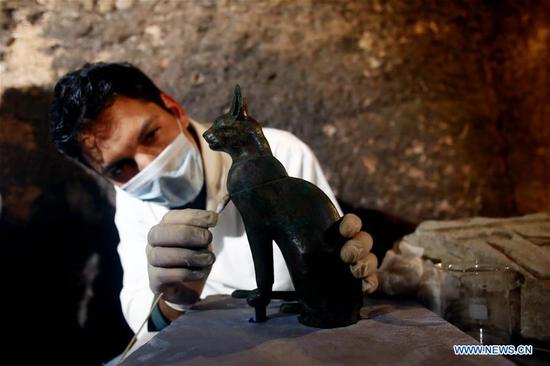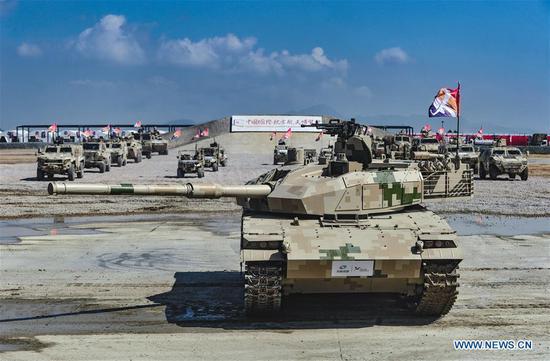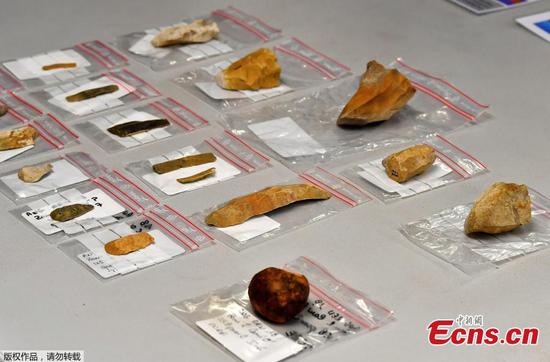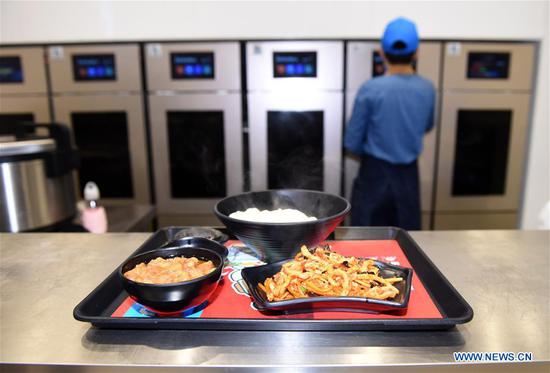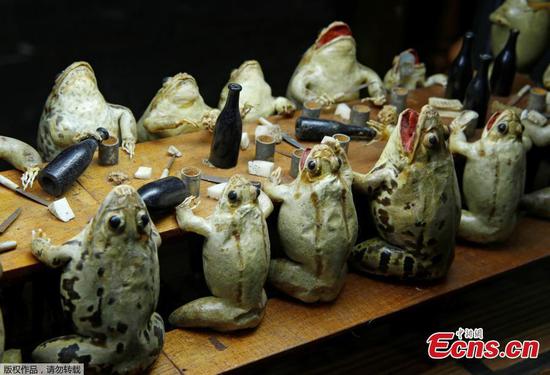Series of control, prevention measures taken
Han Mingguo, a pig breeder in Xinxiang county, Henan Province, has a problem on his hands after an outbreak of African swine fever near his township.
"The cost of raising the pigs has continued to rise since I cannot sell any of them and have to keep feeding them," said Han, who has 300 of the animals. "I am becoming increasingly worried each day as I watch the pigs grow. I am not sure whether I will be able to sell them when they become fully grown."
Zhaipo, the township where Han lives, was included in a restricted zone after the outbreak on Sept. 12 in Huojia county, about 20 kilometers away.
No pigs can be moved out of the township under a measure adopted by local authorities after the outbreak to minimize risks of the disease spreading. A total of 148 pigs have been infected and 64 have died.
In Huojia, other measures were enforced immediately after the outbreak alongside banning the transportation of pigs and pork products to and from a designated quarantine area.
The bodies of pigs who succumbed to the disease and those that had to be slaughtered were properly destroyed and sterilized, along with feedstuff that might be contaminated, according to the county government.
Objects that might have been contaminated, including vehicles and pigs' pens, were also thoroughly sterilized, it added.
The day after the outbreak was confirmed, 2,075 pigs on the farm where it struck were buried to control and prevent the disease spreading, Han said.
"Following the outbreak, I have to hold on to my pigs tightly every day as government employees come to check the number of my animals and their condition," he said. "We have to sterilize the pens three times a day with a liquid sterilizer provided by the township government."
Pig farmers in many areas of the country have been affected by outbreaks of African swine fever in the past three months, and the disease has caused heavy losses to the industry, according to the Food and Agriculture Organization of the United Nations.
More than 50 outbreaks had occurred as of Oct. 19, resulting in more than 100,000 pigs being culled, the FAO said.
"We believe African swine fever will bring serious economic losses to China's pig industry," said Vincent Martin, FAO representative in China and the Democratic People's Republic of Korea. "We also think there is still a high risk of the disease spreading further, and all efforts should be maintained and measures strengthened to keep it under control."
There are no effective vaccines to protect pigs from African swine fever, which is a deadly and highly contagious virus for the animals, but does not infect humans. The virus can survive for long periods in very cold and extremely hot weather, and even in dried pork products, according to the FAO.
China is a major pig producing country, and has some 500 million of the animals, about half of the world's total.
First reported in Kenya in 1921, the disease had never been experienced in China until the first case was reported in Shenyang, in the northeastern province of Liaoning, on Aug. 1.
The Ministry of Agriculture and Rural Affairs said in a news release last month that authorities nationwide have taken effective measures in recent months, resulting in the disease being brought under control. It said restrictions imposed in 12 areas where outbreaks were reported had been lifted, and persistent control and prevention efforts will be made.
"China faces very severe challenges in control and prevention of ASF, and any laziness may result in the spread or even local prevalence of the disease," the ministry said.
African swine fever has been spreading in some nations near China for many years and is likely to be brought into the country again, it said. More than 4,000 outbreaks had been reported in 14 other countries this year, according to the ministry.
Local authorities nationwide have been ordered to report any outbreaks immediately and take measures to prevent the disease spreading. Transportation and slaughtering of pigs has come under intensified supervision.
At the end of August, the ministry ordered pig farmers not to use kitchen leftovers to feed their animals, to eliminate risk of the virus being transmitted from humans' food to pigs.
Despite recent outbreaks of the disease in more than 10 provinces, autonomous regions and municipalities, it has not had a major impact on the supply of pork to the market, and prices of the nation's most commonly eaten meat have not seen huge fluctuations, said Tang Ke, market and information head at the ministry.
Agricultural authorities have stepped up monitoring of the pork market and taken measures to ensure supplies in recent months, he said.
The average wholesale price of pork in China rose to about 20 yuan ($2.90) a kilogram in September, an increase of 15.2 percent from July, before starting to fall slightly last month, Tang said.
While cities such as Beijing and Shanghai have seen pork prices rise due to reduced supply, prices in areas hit by the disease have fallen, Tang said.
Zhu Zengyong, an industry researcher at the Chinese Academy of Agricultural Sciences, said the outbreaks had caused serious disruption to pork markets in many places, and heavy blows to pig farmers, with prices falling by as much as 50 percent in some areas where the disease has been reported.
In Liaoning, the wholesale price of pork has fallen to as low as 8 yuan a kg, less than the cost of raising the animals, which is 12 yuan a kg, he said.
"Under the current measures, live pigs and pork cannot be transported out of an area with outbreaks until quarantine measures are lifted," he said.
In Northeast China, including Liaoning, most of the pigs raised are moved to other areas to be slaughtered and sold, but the disease has halted this, causing a glut of pigs in areas where outbreaks have been reported, Zhu said.
"This has caused many slaughterhouses to try to reduce the price of pork by as much as possible, bringing heavy losses to farmers raising pigs, and to pig production companies," he added.
In contrast, in some areas, such as Sichuan province and Chongqing, which rely on pigs being transported to them, pork prices have risen significantly due to a supply shortage.
"This shortage may be more serious when Spring Festival comes around, as many locals are preparing to salt pork, as is tradition," Zhu said.
Ke Fengxiang, a 53-year-old farmer who raises about 20 pigs in Pingdingshan, Henan province, said she had not been greatly affected by the outbreaks, and none of her pigs have had to be slaughtered.
"There are not as many pig buyers as before, so I may be unable to sell some of the adult pigs this year," she said. "Most of the farmers have a wait-and-see attitude, but many farms will not have enough room for pigs if they cannot sell their animals."
Martin, from the FAO, said: "The ongoing epidemic shows that it is everyone's business. A lot of work still needs to be done to raise awareness among small farmers and all players along the value chain on the importance of the disease, so that each and every one can contribute to this national effort."
Sun Yuan, a researcher at the Harbin Veterinary Research Institute, in Harbin, Heilongjiang province, said sustained efforts are needed to control and prevent the disease to ensure security for the pork industry.
"The risk of the disease spreading is very high due to many reasons," he said, adding that the high numbers of pigs and the fact that pork consumption in many areas relies on live animals being transported have posed great difficulties in controlling the disease and preventing it from spreading.
Sun said intensified monitoring and inspection should be carried out in key places, including slaughterhouses, meat processing factories and on roads where pigs are transported.
China will encourage the transportation of meat, including pork and poultry, in refrigerated vehicles, and smaller cargoes of live pigs and chickens, according to a circular released last month by the State Council, the country's Cabinet, to control and prevent African swine fever.
Moving live farm animals over long distances is a major reason for the spread of diseases, the Ministry of Agriculture and Rural Affairs said, adding that measures will be taken to encourage pig slaughtering near farms before the meat is taken under refrigeration to other areas.
Zhu, from the Chinese Academy of Agricultural Sciences, said pork supplies rely on the transportation of pigs for many reasons, including the preference among people in some areas for fresh meat, and the uneven distribution of slaughterhouses.
"Following the outbreaks, transporting live pigs across different provinces has been banned in many places, resulting in many producers wishing they had had time to adapt to this."
Xi Chunling, vice-president of the China Association for the Promotion of International Agricultural Cooperation, said raising pigs in healthier conditions can reduce disease and control outbreaks.
"Improving welfare for farm animals, such as reducing the density of pigs on farms, can make them healthier and prevent and control diseases at the root," she said. "In this way, fewer antibiotics need to be used, which also improves food safety."
Philip Lymbery, chief executive of Compassion in World Farming, an organization in the United Kingdom that promotes farm animal welfare, said improving conditions for pigs can help reduce diseases such as African swine fever.
"It is a terrible disease-in China and in other countries," he said. "We sincerely hope that the right action will be taken to protect animal welfare to control it. But for the future, good animal welfare will help Chinese agriculture to become less susceptible, less inclined to these diseases."
The ministry said the outbreaks have also exposed loopholes in animal disease prevention and control systems in some places, such as a lack of talent, funding and infrastructure, which has hampered the timely discovery, reporting and handling of cases.
The ministry will increase funding to grassroots veterinary institutes to improve their ability to control and prevent animal diseases, it said.










